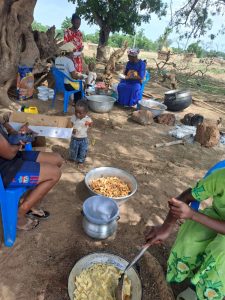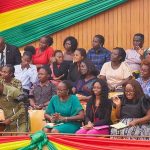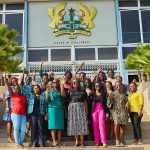Africa Centre for Human Rights and Sustainable Development (AfCHuRSD), under its women and girls empowerment project, Girls and Women Economic Empowerment, Livelihood and Participation in Leadership (GWEEL), organised training for selected women and girls in 13 communities in the Nadowli-Kaleo District in the Upper West Region.
The program aims to empower women and girls in income-generating activities to improve their living standards.
The training brought together over 350 women and girls from Nanga, Nadowli, and Duong communities. The participants were taken through income-generating activities such as soap making, pastry making and food preparation.
 Speaking at the event, Pognaaa Domitila Boator, the Queen Mother of Nanga, narrated some of the challenges faced by the women in her community. She indicated that women in the Nanga community face financial and economic constraints due to the lack of artisanal training.
Speaking at the event, Pognaaa Domitila Boator, the Queen Mother of Nanga, narrated some of the challenges faced by the women in her community. She indicated that women in the Nanga community face financial and economic constraints due to the lack of artisanal training.
She added that women who are into farming could not expand their farmlands due to the high cost of farm inputs. According to her, any start-up capital would go a long way to improve the financial situation of women and girls.
Madam Eunice Doozie, a participant from the Duong community, expressed her joy and said: “With this training, I will be able to make soap, sell some and keep some for my family’s use, and I will not have to buy soap again.”
Another participant, Madam Martina Ansongmwini, noted that the training would serve as a condition for her to secure a loan from her Village Savings and Loans Association (VSLA), to invest in the soap-making business due to its potential to transform her economic fortunes.
In her closing remarks at Nanga, Madam Bernice Naah, the Executive Director of AfCHuRSD-Ghana, encouraged participants to take advantage of the training to improve their livelihoods. She added that AfCHuRSD takes delight in providing skills training that impacts the lives of deprived women and girls.
Madam Naah also encouraged the teenage mothers not to throw their hands in despair, but to take advantage of opportunities such as the skills training to better their lives.
The GWEEL project is funded by the Equal Opportunity Fund (EOF) of the Netherlands, and it’s being implemented in 20 communities in the Daffiama.





